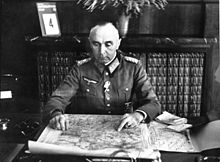Paul Bader (General)
Paul Bader (born July 20, 1883 in Lahr , † February 28, 1971 in Emmendingen ) was a German officer and general of the artillery and Wehrmacht commander in occupied Serbia during World War II .
Life
Bader joined the 4th Baden Field Artillery Regiment No. 66 in his hometown on October 1, 1903 as a flag junior . There he was appointed ensign on February 19, 1905 and promoted to lieutenant on May 21, 1906 . From April 1, 1912 to August 15, 1912 he served as an adjutant in the 1st battalion of his regiment and then came on October 1, 1912 as a regimental adjutant to the 3rd Upper Alsatian Field Artillery Regiment No. 80 in Colmar . Here he became first lieutenant on November 20, 1913 .
With the outbreak of World War I and mobilization , Bader and the regiment were deployed on the Western Front . As a captain (since April 18, 1915), he was transferred to the 39th Field Artillery Brigade from October 12, 1915 and was employed as an adjutant.
After the end of the war he served in the Reichswehr and was in command of the 5th Artillery Regiment from April 1, 1933 to September 30, 1934 and later in the Wehrmacht .
As lieutenant general , he led the 2nd infantry division (motorized) during the attack on Poland , including the battle in the Tucheler Heide , and in the western campaign .
In July 1941 he was promoted to general of the artillery and appointed military commander in Serbia , where he was ordered to "immediately start the attack against the communist terrorist gangs". On October 4th of the same year General Field Marshal Wilhelm List gave him the order to set up so-called hostage collection camps to combat resistance groups in order to shoot the hostages if necessary. On October 10, 1943 Bader had to take over command of the XXI. Abandoned Mountain Army Corps and was initially transferred to the Führerreserve , and then on March 31, 1944, retired.
Bader lived in Emmendingen after the war. During an interrogation on January 3, 1964, he claimed to have known nothing about the shooting of hostages by the Wehrmacht or troops.
Awards
- Iron Cross (1914) 2nd and 1st class
- Knight's Cross 1st Class of the Order of Frederick with Swords
- Knight's Cross II. Class of the Order of the Zähringer Lion with Swords and Oak Leaves
- Hanseatic Cross Hamburg
- Repeat clasp for the Iron Cross II. And I. Class
- German cross in gold on January 29, 1943
literature
- Dermot Bradley , Karl-Friedrich Hildebrand, Markus Rövekamp: The Generals of the Army 1921–1945, Volume 2 v. Blanckensee-v. Czettritz and Neuhauß ; Biblio Verlag, Osnabrück 1993, ISBN 3-7648-2424-7
Web links
- Institute for Contemporary History Munich-Berlin: Witness literature online. ZS 571, Bader, Paul (PDF; 662 kB). Testimony from Bader, April 25, 1952: Situation in Serbia 1941–1944; Suspicions about the shooting of Jews; Transport of prisoners.
Individual evidence
- ^ Ernst Klee : The dictionary of persons on the Third Reich. Who was what before and after 1945 . Fischer Taschenbuch Verlag, Second updated edition, Frankfurt am Main 2005, p. 24, with reference to source 503 ARZ 54/66 BAL, p. 76.
- ^ Quotes from Ernst Klee: Das Personenlexikon zum Third Reich , p. 24.
- ↑ a b c d Ranking list of the German Reichsheeres , Mittler & Sohn Verlag, Berlin, p. 119
- ↑ Klaus D. Patzwall and Veit Scherzer : Das Deutsche Kreuz 1941-1945, History and Proprietor Volume II , Verlag Klaus D. Patzwall, Norderstedt 2001, ISBN 3-931533-45-X , p. 21
| personal data | |
|---|---|
| SURNAME | Bader, Paul |
| BRIEF DESCRIPTION | German officer, most recently general of the artillery in World War II |
| DATE OF BIRTH | July 20, 1883 |
| PLACE OF BIRTH | Lahr |
| DATE OF DEATH | February 28, 1971 |
| Place of death | Emmendingen |
